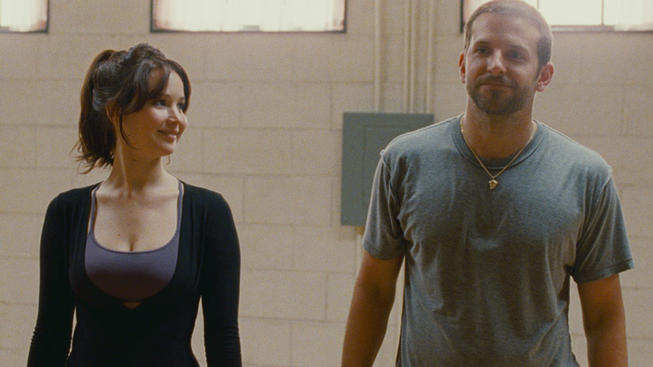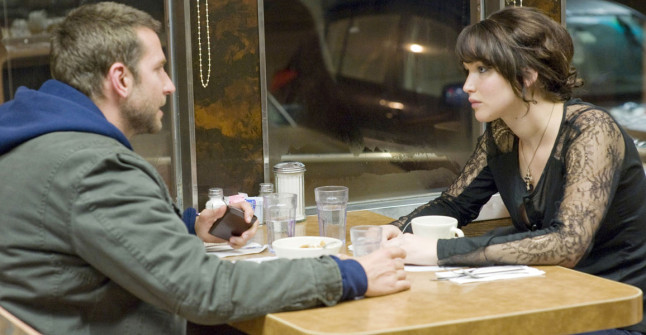Silver Linings Playbook (2012)
CAST: Bradley Cooper, Jennifer Lawrence, Robert De Niro, Jacki Weaver, Chris Tucker, Julia Stiles, John Ortiz, Dash Mihok, Anupam Kher
REVIEW:
Silver Linings Playbook technically falls into the romantic comedy genre, but it’s a less rosy, edgier, more adult version without completely abandoning the tropes fans come to see. As unlikely as it might sound, director David O. Russell (not one to shy away from quirky material) uses mental illness as a catalyst for humor and romance. To that end, Silver Linings Playbook is a quirky, frothy romantic comedy-drama bolstered by solid acting and a more in-depth treatment of mental illness than one might expect.
Pat Solitano Jr. (Bradley Cooper) has just been released from the Baltimore mental hospital where he’s spent the last eight months after a breakdown following catching his wife Nikki (Brea Bee) cheating on him with a co-worker—whom he proceeded to badly assault—and has come home to Philadelphia to stay with his sympathetic mother (Jacki Weaver) and gruff, OCD, football-obsessed father (Robert De Niro) to get back on his feet. But despite a court-ordered daily regimen of medication—which he is unreliable about sticking to—and therapy sessions with Dr. Patel (Anupam Kher), Pat is singlemindedly obsessed with reuniting with Nikki and proving he’s a changed man. The obstacle to this is that she’s taken out a restraining order against him, but Pat might find a way to get around this via mutual acquaintance Tiffany (Jennifer Lawrence). Like Pat, Tiffany suffers from mental illness and an ended marriage (though in her case, she’s a widow), and after a few turbulent encounters, she offers to deliver a letter from Pat to Nikki in exchange for Pat being her partner at an upcoming dance competition. But Pat’s relentless obsession with Nikki casts doubt on his mental progress, and his desperation to recapture a lost love might be blinding him to what’s right in front of him.
For the most part, the movie’s portrayal of mental illness is respectful. It gets central focus, not just serving as a throwaway plot device, and the movie doesn’t shy away from Pat and Tiffany’s sometimes wild mood swings and occasionally unhinged meltdowns, nor does it play them for cheap laughs. In fact, for quite a while, Pat’s daily struggle to hold himself together is the “main” plot point, not the possibility of romance with Tiffany (who doesn’t show up for a while), making the narrative feel a little more substantial. It’s considered a romantic comedy, but it’s not “just” a romantic comedy.
 The cast is well-chosen. This might be more-or-less considered a comedy, but it’s a more grounded role for Bradley Cooper than the likes of The Hangover, and shows he can transition between comedy and drama. Cooper infuses Pat with manic, frazzled energy and doesn’t shy away from a couple breathless tirades without turning the character into a caricature. He’s solidly-matched by Jennifer Lawrence (still sporting the dark hair from The Hunger Games but easily making us forget about Katniss Everdeen), whose tempestuous Tiffany blows in like a force of nature. The scenes between Cooper and Lawrence crackle with energy, enough to make us easily look past the sixteen-year age difference (Lawrence’s 21 to Cooper’s 37). Tiffany was originally cast with Anne Hathaway, who dropped out due to scheduling conflicts, but it’s hard to imagine anyone else being better than Lawrence. Robert De Niro seems to have finally figured out he can appear in a comedy while maintaining a shred of dignity. His character is fatuous at times without being a cartoon, and has at least one poignant purely dramatic scene. Smaller supporting roles include Jacki Weaver, Chris Tucker (mercifully showing a modicum of restraint), Julia Stiles, John Ortiz, Dash Mihok, and Anupam Kher.
The cast is well-chosen. This might be more-or-less considered a comedy, but it’s a more grounded role for Bradley Cooper than the likes of The Hangover, and shows he can transition between comedy and drama. Cooper infuses Pat with manic, frazzled energy and doesn’t shy away from a couple breathless tirades without turning the character into a caricature. He’s solidly-matched by Jennifer Lawrence (still sporting the dark hair from The Hunger Games but easily making us forget about Katniss Everdeen), whose tempestuous Tiffany blows in like a force of nature. The scenes between Cooper and Lawrence crackle with energy, enough to make us easily look past the sixteen-year age difference (Lawrence’s 21 to Cooper’s 37). Tiffany was originally cast with Anne Hathaway, who dropped out due to scheduling conflicts, but it’s hard to imagine anyone else being better than Lawrence. Robert De Niro seems to have finally figured out he can appear in a comedy while maintaining a shred of dignity. His character is fatuous at times without being a cartoon, and has at least one poignant purely dramatic scene. Smaller supporting roles include Jacki Weaver, Chris Tucker (mercifully showing a modicum of restraint), Julia Stiles, John Ortiz, Dash Mihok, and Anupam Kher.
While the fairy tale elements are dialed down, Silver Linings Playbook doesn’t completely abandon the conventions of the romantic comedy formula. There’s the bickering pair fated to end up together, the guy chasing the lost love and overlooking the one right in front of him, and climactic complications and misunderstandings which seem inevitable in these kinds of movies (we even end with the time-honored romantic movie trope of one partner running away in tears after a misunderstanding and the other chasing after them). But the rest of the movie is quirky and unconventional enough that, when it ultimately surrenders to a relatively straightforward romantic comedy formula, it doesn’t feel as glaring as in more generic entries. It’s an adult romantic comedy for adults; there’s no sex, but profanity flows freely (part of what immediately sets Jennifer Lawrence here apart from the more teen-oriented Hunger Games is that she has zero inhibitions about dropping F-bombs) and the characters talk like real, albeit eccentric, people, not cliched movie dialogue. The characters feel more real and edgy, the central focus and serious amount of screentime devoted to the leads’ mental illness makes the narrative feel more substantial and off the beaten track, the humor is subdued and organically derived from the characters’ eccentricities, neither tacked-on juvenile jokes nor cheap laughs at mental illnesses’ expense, the leads are well-acted and have chemistry, and all of the above qualities coming together make Silver Linings Playbook one of the stronger and more substantial entries in the romantic comedy genre to come along in a while. Pat might search for a silver lining, but the audience doesn’t have to look hard for one here.
* * *
